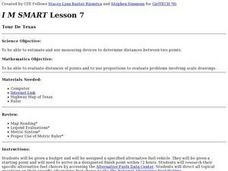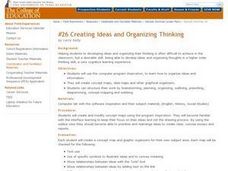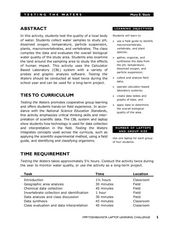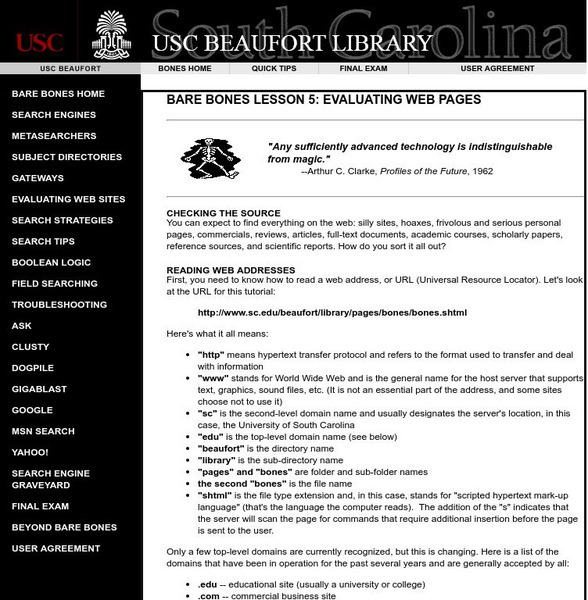Curated OER
Merchants and Craft Guilds
Students compare and contrast the craft guilds of the middle ages to the production of goods today. For this Middle Ages lesson, students discuss the structure of craft guilds after they have read articles on the topic. Students conduct...
Curated OER
Tour De Texas
Middle schoolers are given a budget and an alternative-fuel vehicle. Using a map of Texas, they are given a starting point and determine how to arrive at their destination within 72 hours. They use the internet to research the...
Curated OER
Positively Precise Organization
Fourth graders go online to critique the organization of student writing. They access the Yahooligans website to view the writing pieces. They utilize a worksheet imbedded in this plan which guides their scoring.
Curated OER
Can You Find It?
Fourth graders discover how to do an Internet search. They reviewi traditional rescources used to find answers in the classroom and are introduced to electronic sources. They discuss terminology for navigating the Internet using the...
Curated OER
Website Scavenger Hunt
Young scholars use the internet to complete a species scavenger hunt. In groups, they answer questions given to them about sea lions, rockfish and killer whales. As a class, they identify any questions they have and discuss the role...
Curated OER
Wisconsin History and Information
Fourth graders complete a multi-faceted project about the people, places, and government of Wisconsin. Working with traditional and technological resources, they research various topics related to the history of Wisconsin and create a...
Curated OER
Federal Political Campaign Pamphlet
Students organize and create a six-panel federal political campaign pamphlet. They research the main Canadian federal political parties, analyze the platforms, and organize the information for their pamphlet.
Curated OER
Creating Ideas and Organizing Thinking
Students examine the concept of developing ideas and organizing their thinking. They create concept maps and graphic organizers using Inspiration software, and develop a concept map for their own subject area.
Curated OER
Read (or Scroll) All About It!
Students compare written headlines found in print and online news sources while using The New York Times. They conduct research with the top stories from the newspaper and have discussion that involves critical thinking skills.
Curated OER
New War Against Whom?
Seventh graders write an essay on the Muslims involved with the terrorist attacks on the World Trade Center. They express how the attacks made them feel and what they can do to help.
Curated OER
Roughing It in the Backwoods
Students discuss the differences between living during the mid-19th century and today and then debate which would be better.
Curated OER
Working With Parents
Student teachers learn the importance of understanding the family dynamics of their students to effectively communicate academic and behavioral concerns.
Curated OER
Bell Live! The Great Lakes: A Superior Adventure
Students participate in a virtual field trip to Lake Superior. In groups, they perform experiments in which test the level of toxins and bacteria in the water. They also watch video segments life in the lake and discuss their observations.
Curated OER
Testing the Waters
Students explore water in depth through discussion, research, and experiment. Students apply map skills to locating particular regions of the world as they relate to water. Students predict water quality based on information researched...
Curated OER
Presentations 'How To 10 Steps - WordPerfect (IT)
Learners create a 10-Step slide show describing "How To" make or assemble something. They explore the relationship and impact of information technology and digital media in the business arena. They plan, design, and organize a...
Curated OER
Disease Prevention
Fifth graders examine the various causes of the common cold. Using the internet, they identify the proper way to take care and treat a cold. They also describe the procedure to complete a throat culture. To end the lesson, they...
Other
Who Is Hosting This: How to Evaluate Web Resources
This is an excellent, compact guide to evaluating resources on the Internet. It breaks everything down into easy steps and tells you how to do each. Included is an infographic called 'Evaluating Web Resources: A 60 Second Guide.' It also...
Other
Intute Virtual Training Suite: Internet Detective: Wise Up to the Web
Focused on using the internet for college-level research, this valuable site is visually attractive and well-organized, and includes a number of interactive features.
Sophia Learning
Sophia: Evaluating Digital Information: Tutorial
In this slideshow tutorial, students will review how to evaluate digital sources. During the digital evaluation process, students are directed to analyze the following: authority, accuracy, objectivity, and currency. After the tutorial,...
Other
Bare Bones Lesson 5: Evaluating Web Pages
Read web addresses with confidence, check the content and vital statistics and be more discriminating in your selection of web resources after you take this mini-lesson in website evaluation.
Cornell University
Cornell University: Evaluating Web Sites: Criteria and Tools
Examining context as well as other factors is important for research success. Learn what questions to ask and what factors to look for in the evaluation process.
Education Place
Houghton Mifflin: Eduplace: Finding and Evaluating Web Sites
"When you need to do research, the World Wide Web is a great resource." Find out what to look for in using quality sites for your research.
Other
Kathy Schrock's Home Page: Abc's of Website Evaluation [Pdf]
Noted technology educator Kathy Schrock provides an alphabetical list of qualities to evaluate in judging websites. She provides example websites to look at for each quality. In addition, she gives a list of websites to use when...
Other
Classroom Tech: Evaluating Web Credibility
There is a vast amount of information on the internet, but how much of it is credible? This site presents tips on how to verify the information on a website and not be fooled by web "spoofs". Refer to the checklist for evaluating sources.























